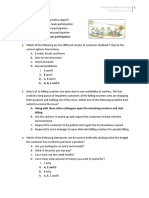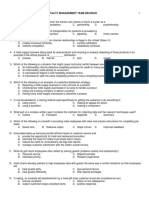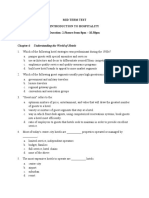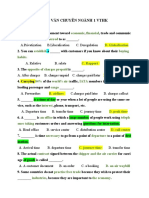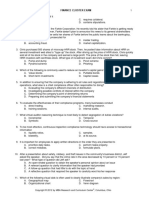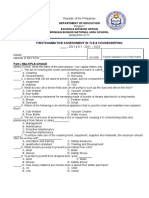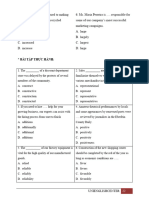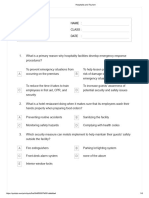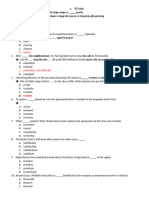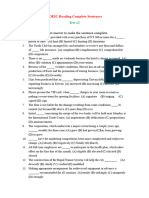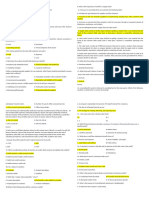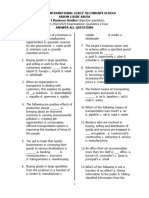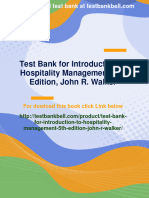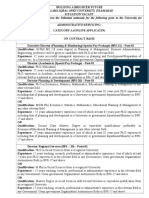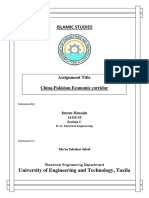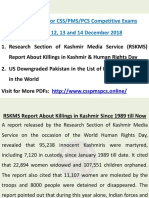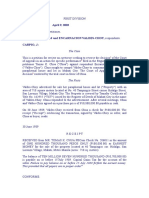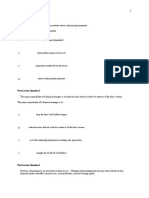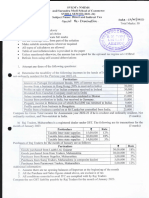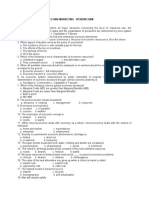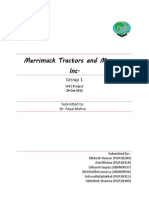2009 DECA Ontario Provincials Competition HLM: D E C A
2009 DECA Ontario Provincials Competition HLM: D E C A
Uploaded by
Imran HussainCopyright:
Available Formats
2009 DECA Ontario Provincials Competition HLM: D E C A
2009 DECA Ontario Provincials Competition HLM: D E C A
Uploaded by
Imran HussainOriginal Description:
Original Title
Copyright
Available Formats
Share this document
Did you find this document useful?
Is this content inappropriate?
Copyright:
Available Formats
2009 DECA Ontario Provincials Competition HLM: D E C A
2009 DECA Ontario Provincials Competition HLM: D E C A
Uploaded by
Imran HussainCopyright:
Available Formats
2009 DECA Ontario Provincials Competition HLM
Test 1005B HOTEL AND LODGING MANAGEMENT 1
1. Convention hotels usually are unable to enter into legally binding contracts with
A. foreigners. C. minors.
B. senior citizens. D. tourists.
2. Receiving goods, sorting goods, and assembling shipments are all activities that make up the distribution
activity of
A. stock handling. C. packaging.
B. transportation. D. shipping.
3. What advantage do distribution channel members have in using satellite technology?
A. Increases manufacturing outputs C. Ensures accurate order processing
B. Offers real-time shipment tracking D. Provides transportation flexibility
4. Resort pro shops that buy products from suppliers that are not the authorized distributors for the
products' manufacturers are involved in the
A. export business. C. gray market.
B. outlet industry. D. discount trade.
5. A vending company buying products from several businesses and putting the products in hotel vending
machines for customers to buy is an example of a(n)
A. service business. C. independent agent.
B. product wholesaler. D. distribution channel.
6. One reason hospitality businesses evaluate their channel members on a regular basis is to determine if it
is necessary to
A. reschedule shipments. C. make adjustments.
B. increase maintenance. D. eliminate customers.
7. The front desk can be a hectic work area at times. Front desk clerks can still give good service under
these conditions if they
A. are able to organize others. C. know how to avoid problems.
B. have good accounting skills. D. stay calm during interruptions.
8. The ultimate purpose of preparing a long, complex, business report is usually to
A. present accurate data. C. be well organized.
B. present all views. D. help with major decisions.
9. The reason hotel chain employees often do research and write proposals is to
A. provide recommendations. C. investigate resources.
B. organize information. D. understand complex data.
10. When Bill took a guest's request for a wake-up call, he asked the guest for the room number, the
day/date of the call, and the time the guest wanted to be called. He then thanked the guest and hung up.
What else should Bill have done?
A. Asked about the guest's destination C. Read the information back to the guest
B. Checked the guest's credit record D. Thanked the guest for choosing the property
11. The human relations element that contributes to success in the hotel gift shop is
A. establishing good customer/client relations. C. having an easy return policy.
B. offering a wide variety of merchandise. D. offering high-quality merchandise.
12. Eva works at a hotel registration desk. When a customer was checking in tonight, Eva reminded him that
checkout time would be 11:00 a.m. "No, it's not!" he exclaimed. "It's always at 11:30!" Eva's customer is
a(n) __________ customer.
A. suspicious C. impatient
B. argumentative D. leave-me-alone
Students ‘Demonstrating Excellence Celebrating Achievement’ since 1979
2009 DECA Ontario Provincials Competition HLM
Test 1005B HOTEL AND LODGING MANAGEMENT 2
13. What step in the receiving process would ensure that the hotel supplies received are the items that were
ordered?
A. Checking the shipping label on each container
B. Conducting a random check of a few containers
C. Comparing the delivery receipt with the purchase order
D. Counting the number of containers that are being delivered
14. A hotel coffee shop that has supplies and fresh food items delivered daily usually is able to
A. allocate a small amount of space for storage.
B. reduce the number of employees on staff.
C. eliminate the need for refrigeration units.
D. negotiate a low price with many vendors.
15. Why should hotel restaurant employees wash their hands after touching raw foods and before handling
and storing clean kitchen utensils?
A. To eliminate the need to develop handling procedures
B. Because employee productivity usually increases
C. To reduce the risk of bacterial contamination
D. So food workers can sanitize the utensils again before use
16. Goods and services that are purchased for use to operate a hospitality business are known as
__________ goods and services.
A. shopping C. specialty
B. industrial D. convenience
17. What does utility reveal about consumers?
A. Influences C. Background
B. Income D. Preferences
18. Who owns a good if the good is used in performing a service for a motel guest?
A. The supplier of the good to the motel C. The producer of the good
B. The guest who buys the service D. The motel performing the service
19. Each purchase strengthens the economy by encouraging
A. trade. C. investment.
B. expansion. D. competition.
20. A high rate of unemployment usually has a negative impact on a country's
A. personal income tax. C. gross domestic product.
B. equilibrium price level. D. terms of trade.
21. Inflation occurs when demand exceeds supply, and prices
A. stabilize. C. decrease.
B. contract. D. rise.
22. Which of the following is confidential information that would be unethical for an employee to provide to
others without permission from the hotel chain:
A. List of employees who will be promoted C. Well-publicized expansion plans
B. Posting of available positions D. Dates of an upcoming special sale
23. An effective team-building technique involves allowing team members to
A. make individual decisions. C. work independently.
B. share responsibility. D. set personal goals.
24. Which of the following is a powerful motivator that often prompts hotel employees to take action:
A. Leadership C. Feedback
B. Criticism D. Recognition
Students ‘Demonstrating Excellence Celebrating Achievement’ since 1979
2009 DECA Ontario Provincials Competition HLM
Test 1005B HOTEL AND LODGING MANAGEMENT 3
25. The hotel supervisor who exercises very little or no control over employees is using the __________ style
of leadership.
A. democratic C. subordinate
B. authoritarian D. laissez-faire
26. How can lodging facilities best accommodate guests who have special needs during their stay?
A. Make sure that the hotel has ample wheelchairs and walkers available for guests with mobility
impairments
B. Train each hotel employee in sign language to accommodate guests with hearing impairments
C. Have front desk employees provide guests with a special-needs questionnaire during the check-
in process
D. Ask guests if they need special accommodations and make a notation during the reservation
process
27. Which of the following is a basic guideline that front desk clerks should always follow when assisting
guests who have disabilities:
A. Don't embarrass guests with disabilities by looking directly at them.
B. Identify specific disabilities through observation.
C. Raise your voice if a guest does not seem to understand you.
D. Remember that the guest is a person with a disability.
28. Financing is important to a motel chain because it often provides the motel chain with needed
A. development funds. C. corporate bonds.
B. investment capital. D. retirement assets.
29. Accounting records for a hospitality business show that the week's total sales revenues were $125,000.
Cash sales accounted for $50,000 and credit sales, $75,000. This is an example of
A. the cash accounting method. C. an income statement.
B. the accrual method of accounting. D. classifying financial information.
30. A hospitality business's cash flow statement for one month indicates cash sales of $4,275, credit sales of
$2,960, shipping costs of $525, and fixed expenses of $2,380. Calculate the total cash receipts.
A. $6,655 C. $4,275
B. $2,960 D. $7,235
31. Calculate the amount of money that a hotel can budget to spend on new equipment if it estimates sales
of $690,000, expenses of $325,000, and designates 25% of profit for equipment purchases.
A. $91,250 C. $81,250
B. $83,500 D. $96,000
32. A motel charges $90 per night for each of its 60 rooms. What amount of income should it forecast for next
week if it expects that 70% of all rooms will be rented each night?
A. $26,460 C. $28,790
B. $27,970 D. $29,640
33. An important reason that lodging establishments maintain records of the number of times individuals visit,
and their room preferences, is in order to
A. do strategic marketing. C. stock adequate supplies.
B. schedule renovations. D. hire seasonal employees.
34. Calculate the employee turnover rate if the average number of employees last year was 500, and the
hotel hired 60 new employees to replace those that left during the year.
A. 15% C. 12%
B. 10% D. 16%
Students ‘Demonstrating Excellence Celebrating Achievement’ since 1979
2009 DECA Ontario Provincials Competition HLM
Test 1005B HOTEL AND LODGING MANAGEMENT 4
35. Many economy motel chains expect their supervisors to provide employee training because supervisors
A. usually welcome this responsibility. C. know how to train employees.
B. know how jobs should be done. D. have the time to do training.
36. In order for hotel managers/supervisors to be able to view the hotel chain as a whole, they need
__________ skills.
A. decision-making C. human relations
B. technical D. conceptual
37. Which of the following is a factor that has contributed to the diversity of today's workforce:
A. Legislation C. Competition
B. Productivity D. Communication
38. An important forecasting variable to keep in mind when establishing staffing and service ratios is
A. operations-oriented planning. C. facility requirements.
B. changing customer demands. D. flexibility in management.
39. When a marketing-information system compares financial information from one time period with the
financial data from another time period, it provides a picture of the bed and breakfast business's
A. situation analysis. C. sales forecasts.
B. profits. D. distribution.
40. When obtaining marketing information from guests, why is it important for hotels to tell guests how their
personal information will be used?
A. To analyze data C. To follow the law
B. To be ethical D. To achieve goals
41. Why do some hotel chains' computers place a "cookie" on a visitor's hard drive when the visitor accesses
the chain's web site?
A. To ensure privacy C. To protect data
B. To track usage D. To eliminate theft
42. What are general considerations that convention hotels must evaluate when assessing their ongoing
marketing-information needs?
A. Sample size and measurement C. Data relevancy and application
B. Variables and statistical range D. Production standards and mode
43. Which of the following is an example of range:
A. Consumers rent an average of eight motel rooms per month.
B. Most consumers rent six motel rooms per month.
C. Consumers rent between five and ten motel rooms per month.
D. Half of all consumers rent more than seven motel rooms per month.
44. A purpose of keeping a hotel's guest-history records up-to-date is to
A. identify a target market. C. control expenses.
B. reduce advertising needs. D. improve housekeeping.
45. A hotel cafe manager who is calculating the costs of products is performing the marketing function of
A. pricing. C. product/service management.
B. financing. D. accounting.
46. A true statement about a hotel chain's marketing mix would be that once the hotel chain has established
its marketing mix, the hotel chain
A. should compare the mix with those of other hotel chains.
B. is finished with that marketing activity.
C. is ready to coordinate the four elements of the mix.
D. should review the mix from time to time.
Students ‘Demonstrating Excellence Celebrating Achievement’ since 1979
2009 DECA Ontario Provincials Competition HLM
Test 1005B HOTEL AND LODGING MANAGEMENT 5
47. Beach resorts identify market segments by dividing consumers into groups that have
A. unusual interests. C. inconsistent values.
B. financial needs. D. similar characteristics.
48. Which of the following is an example of a marketing objective that a motel might include in its marketing
plan:
A. Hire five new salespeople next month C. Achieve $2 million in sales next year
B. Increase advertising by 10 percent D. Maintain prices at a competitive level
49. SWOT analysis is a technique for summarizing a hospitality business's
A. skills, workers, organizations, and teams.
B. strengths, weaknesses, opportunities, and threats.
C. strategy, wholesalers, objectives, and trademarks.
D. store, warranty, occupations, and tariffs.
50. Why is it important for hotel chains to assess global trends and opportunities?
A. Governments in other countries hold elections.
B. Hotel chains hire employees from other countries.
C. Worldwide economic conditions affect marketers.
D. Foreign trade creates monopolies.
51. Under which of the following circumstances might it be useful for a motel chain to develop a long-term
sales forecast:
A. Impending expansion C. Unstable economy
B. Insufficient capital D. Unchanging market
52. When setting marketing objectives, what should hotels include to make the objectives more effective?
A. Anticipated customer response to the objective
B. Reason for developing the objective
C. Methods of carrying out the objective
D. Time period to accomplish the objective
53. Which of the following is an example of a hotel supply business using sales analysis to control marketing
planning:
A. Preparing sales reports for territories C. Setting sales goals for all salespersons
B. Forecasting sales for future periods D. Comparing sales goals with actual sales
54. Which of the following factors do hospitality businesses usually evaluate and analyze when conducting a
marketing audit:
A. Advertising C. Staffing
B. Purchasing D. Invoicing
55. A current trend in the hospitality industry is to build loyal customer relationships and enhance service
levels by optimizing the use of
A. service rating advisors. C. independent travel agents.
B. satellite roving devices. D. Internet web sites.
56. Front desk employees often maintain hotel logbooks so the next work shift can
A. schedule room service and housekeeping personnel.
B. track unauthorized data obtained from the night auditor's report.
C. review activities and situations that require follow-up.
D. forecast quarterly occupancy ratios and walk-in arrivals.
57. Which of the following is a technique that a resort hotel's employees can use to help prevent accidents
on the job:
A. Maintain clean workplace C. Take frequent shortcuts
B. Avoid regular exercise D. Lift heavy packages
Students ‘Demonstrating Excellence Celebrating Achievement’ since 1979
2009 DECA Ontario Provincials Competition HLM
Test 1005B HOTEL AND LODGING MANAGEMENT 6
58. Which of the following questions should be answered by the purchasing function of a hotel gift shop:
A. How much merchandise should we buy?
B. How can we inform customers of available merchandise?
C. How will merchandise be shipped to us?
D. How can we protect merchandise from pilferage?
59. Which of the following is a situation in which a bed and breakfast could use the budget information to
make operating changes:
A. Accounts receivable are on target. C. Expected profits are increasing.
B. Total revenues exceed projected costs. D. Estimated sales exceed actual sales.
60. A hotel restaurant that inspects its equipment on a regular basis is practicing
A. preventive maintenance. C. form utility.
B. vendor analysis. D. physical inventory.
61. Which of the following policies would best allow a ski resort to meet a temporary increase in demand for
service without sacrificing productivity or increasing costs:
A. Hiring additional employees
B. Increasing the work hours of current employees
C. Using employment agencies to supply temporary workers
D. Cross-training employees to perform several different jobs
62. Tips and gratuities earned in excess of $20 per calendar month must be reported as income to the
Internal Revenue Service except for
A. money received directly from customers. C. tips received from other employees.
B. service charges that are added to a bill. D. tips that customers charge to their bills.
63. When packages are delivered to a hotel for a guest, an important step in processing the deliveries
involves
A. indicating date and time of receipt. C. adding the charge to the guest's bill.
B. contacting the hotel bell staff. D. determining the contents of the package.
64. Which of the following examples might require hotel maintenance personnel to handle guests' complaints
in regard to their sleeping rooms:
A. Broken fitness equipment C. Damaged computer equipment
B. Dirty linens and towel replacement D. Faulty heating and cooling controls
65. When a hotel guest has a garment bag, the bell person should take it to the guest's room and
A. set it on a chair. C. lay it across a bed.
B. hang it in the closet area. D. drape it over the other luggage.
66. When developing emergency plans for a lodging facility, managers should establish written evacuation
and __________ procedures.
A. storage C. training
B. surveillance D. medical
67. The attitude "There is always another day" is best described as
A. prioritization. C. organization.
B. procrastination. D. delegation.
68. Offering to provide additional information after a job interview is often the function of a(n)
A. follow-up letter. C. handwritten note.
B. telephone call. D. e-mail question.
69. Which of the following often helps members to increase their profitability and solve common problems:
A. Chambers of commerce C. Regulatory agencies
B. Professional organizations D. Trade associations
Students ‘Demonstrating Excellence Celebrating Achievement’ since 1979
2009 DECA Ontario Provincials Competition HLM
Test 1005B HOTEL AND LODGING MANAGEMENT 7
70. What type of hotel provides recreational facilities, activities such as golf and tennis, and is often
considered a vacation destination?
A. Extended-stay C. Resort
B. Convention D. Bed and breakfast
71. A chain of hotels located in a resort area that rents its rooms at extremely low rates in an effort to
eliminate the competition is involved in
A. price fixing. C. price lining.
B. promotional pricing. D. predatory pricing.
72. To determine if a product idea is practical to produce, a manufacturer of hotel furniture should
A. hire an outside consultant. C. conduct further research.
B. assess the marketing plan. D. establish a production committee.
73. A hotel restaurant interested in offering the highest possible quality of meat would choose which USDA
grade?
A. Select C. Prime
B. Choice D. Standard
74. A bed and breakfast business's new computer came with the salesperson's promise of free service and
repairs. This promise is an example of an
A. express warranty. C. implied warranty.
B. implied guarantee. D. express guarantee.
75. One way a hotel supply business can identify products to fulfill customers' needs is by
A. organizing a focus group. C. designing a survey.
B. observing processes. D. conducting research.
76. Which of the following is a correct statement concerning services offered by hotels/motels:
A. Added services generate little profit.
B. Offering additional services is a competitive advantage.
C. Most guests ignore hotel/motel services.
D. Hotels/Motels now offer every possible service.
77. Small hospitality businesses can compete with larger ones in the area of customer service by
A. having employees process guest complaints by computer rather than in person.
B. establishing customer-service departments to handle complaints.
C. offering small service gestures that don't cost a lot of money.
D. absorbing all service costs so that customers don't have to pay for anything.
78. Hotel supply businesses develop specific positioning strategies for their products because they want to
A. determine advertising needs. C. increase employee productivity.
B. create a particular image. D. appeal to unknown markets.
79. Emotional connections with hotel guests are frequently strengthened by
A. changing a brand's core values to meet guests' changing needs.
B. a hotel owner's personality.
C. pleasing colors and textures used in the hotel's reception area.
D. a brand's personality.
80. The Fit and Lively Health Spa, a resort that is located in a remote mountain region, is most likely to plan
which of the following activities for its guests:
A. Broadway play C. Nature hikes
B. Scuba diving D. Pastry and food festival
Students ‘Demonstrating Excellence Celebrating Achievement’ since 1979
2009 DECA Ontario Provincials Competition HLM
Test 1005B HOTEL AND LODGING MANAGEMENT 8
81. When selecting a hotel site for a one-day seminar, a conference planner's first consideration is the
A. hotel's check-in/checkout times. C. size of the sleeping rooms.
B. availability of meeting space. D. accessibility to attractions.
82. What is an important purpose of promotional advertising?
A. To replace visual merchandising C. To improve business image
B. To create goodwill D. To stimulate sales
83. More businesses are installing kiosks in hotel lobbies and using the kiosks to promote their goods and
services because this form of technology is
A. interactive. C. portable.
B. generic. D. seasonable.
84. Which of the following limits the usefulness of the Internet as an advertising tool:
A. Action and sound capabilities C. Linking
B. E-mail filter D. Personalization
85. Which of the following is a method of direct marketing:
A. Cold calling C. Merchandising
B. Telemarketing D. Event planning
86. A resort hotel's sales promotion activities, such as giveaways, contests, premiums, and special sales, are
most effective when they are
A. coordinated with other promotional activities.
B. kept separate from other promotions.
C. used instead of expensive advertisements.
D. repeated at regular intervals.
87. What information would a banquet manager most likely include in a sales packet that is distributed to
prospective customers?
A. Brochure, contract, and restaurant menu
B. Price list, brochure, and scheduling sheet
C. Contract, photographs of the facility, and testimonials
D. Sample menu, price list, and photographs of the facility
88. One way that hotel supply salespeople can build relationships through the use of effective customer
service is to
A. help their businesses hire productive employees.
B. spend a lot of time visiting with customers.
C. look for new techniques that benefit customers.
D. identify methods of saving money for their businesses.
89. The most important attitude for a hotel's salespeople to possess is usually a(n) __________ attitude.
A. passive C. service
B. interesting D. unique
90. Computer technology has impacted the selling function by making it possible for businesses to
A. sell online. C. eliminate inventory.
B. save money. D. increase staff.
91. Which of the following is an example of a front desk clerk explaining to a guest the unique benefits that
the hotel offers:
A. The restaurant offers a wide menu throughout the day.
B. This is the only property that has an exercise facility.
C. The rates for a junior suite are competitively priced.
D. Each room is equipped with a steel-reinforced door.
Students ‘Demonstrating Excellence Celebrating Achievement’ since 1979
2009 DECA Ontario Provincials Competition HLM
Test 1005B HOTEL AND LODGING MANAGEMENT 9
92. Consumers of hospitality products have the right to expect businesses to provide goods and services that
A. furnish several amenities. C. are safe and clean.
B. meet each individual's standards. D. maintain international requirements.
93. The method of answering customers' objections that is considered the least acceptable is the
__________ method.
A. yes, but . . . C. question
B. direct-denial D. third-party
94. Isaac spent several nights in a hotel operated by a well-known chain. He had a series of dissatisfactions
including no fresh towels and slow room service. During checkout, Isaac was given a customer-response
card to complete, which he did in great detail. The best follow-up by the hotel to this customer's negative
feedback is a
A. letter of apology and a free evening stay the next time Isaac is in town.
B. letter of apology and a thank-you for pointing out problem areas.
C. mailed letter of apology.
D. personal telephone call to thank Isaac for taking time to share his experiences.
95. When selling to a convention group that will make the buying decision, it is important for a hotel's
salesperson to __________ in the presentation.
A. include objections C. allow for mistakes
B. analyze competitors D. involve all members
96. Why is it important for hotel sales managers to regularly evaluate the performance of salespeople?
A. To obtain feedback C. To increase compensation
B. To help them sell D. To identify a target market
97. A full-service hotel food and beverage manager must determine the sales of specific menu items at
regular intervals during the day. The most efficient and accurate way to obtain the information is by
A. requesting tally sheets from each server.
B. running inventory status reports.
C. accessing the electronic point-of-sale system.
D. reviewing customer charge slips.
98. Which of the following is an example of the proper way for a hotel restaurant cashier to process cash
sales:
A. Roger counts the change aloud as he removes it from the cash drawer.
B. Jason counts aloud when handing change to a customer.
C. Rose announces the purchase price of the item before she rings it up.
D. Mary puts the customer's money into the cash drawer before counting the change.
99. Why would a hotel clerk run a guest's credit card through a credit-card validator?
A. To verify the reservation C. To obtain an approval code
B. To print data on a voucher D. To establish the room rate
100. One way that hotel managers can promote ethical behavior on the part of everyone in the hotel is by
encouraging employees to
A. develop a code of ethics. C. be thoughtful of others.
B. report unethical actions. D. avoid social situations.
Students ‘Demonstrating Excellence Celebrating Achievement’ since 1979
2009 DECA Ontario Provincials Competition HLM
Test 1005B HOTEL AND LODGING MANAGEMENT 10
1. C
Minors. Convention hotels usually are prevented from entering into legally binding contracts with certain
groups of people because these people are not considered to have the capacity to understand the
consequences of their actions. One of these groups includes minors, those people under the legal age. In
most cases, minors cannot enter into legally binding contracts because they are not old enough to be
responsible for the consequences. Convention hotels usually may enter into legally binding contracts with
people who are adults, older than the legal age, regardless of whether they are foreigners, senior
citizens, or tourists.
SOURCE: BL:002
SOURCE: Mescon, M.H., Bovee, C.L., & Thill, J.V. (1999). Business today (9th ed.) [pp. 617-618].
Upper Saddle River, NJ: Prentice Hall.
2. A
Stock handling. Stock handling is the process of receiving goods, sorting them so that they are in the
right place, and assembling orders for shipment to their final destination. Transportation is the act of
moving anything from one place to another or the method by which it is moved. Shipping is another term
for transporting. Packaging is a distribution activity that involves enclosing products in appropriate
wrappings or containers.
SOURCE: CM:001
SOURCE: Clark, B., Sobel, J., & Basteri C.G. (2006). Marketing dynamics (pp. 352-355). Tinley Park,
IL: Goodheart-Willcox.
3. B
Offers real-time shipment tracking. Satellite technology involves electronically transmitting information
from one source to another via an orbiting device. Satellite technology is beneficial to distribution channel
members because it can track shipments that are in transit. For example, if a customer wants to know the
status of an order and when it will arrive, the shipper can use satellite technology to quickly determine
exactly where the transporter (e.g., truck) is en route. Satellite technology does not necessarily increase
manufacturing outputs, ensure accurate order processing, or provide transportation flexibility.
SOURCE: CM:004
SOURCE: Coyle, J.J., Bardi, E.J., & Langley, C.J. (2003). The management of business logistics: A
supply chain perspective (7th ed.) [pp. 464-465]. Mason, OH: South-Western.
4. C
Gray market. The gray market involves buying goods from suppliers that are not the authorized
distributors for the manufacturers. This practice is considered unethical and even illegal because the
suppliers do not have the right to sell the goods. Resort pro shops often are able to buy goods for lower
prices on the gray market, which enables them to sell the goods for less. Exporting is the process of
selling goods and services to businesses in other countries. Outlet stores usually sell overruns and
irregular products. Discount stores sell regular merchandise at lower prices than those found in
department stores.
SOURCE: CM:006
SOURCE: Solomon, M.R., & Stuart, E.W. (2000). Marketing: Real people, real choices (2nd ed.)
[p. 110]. Upper Saddle River, NJ: Prentice Hall.
5. D
Distribution channel. Distribution channels are the paths, or routes, that goods or services take from the
producer to the ultimate consumer or industrial user. A vending company buying products from several
businesses and selling them through vending machines to hotel guests is an example of a direct channel
of distribution. The vending company is buying the products from manufacturers and selling them directly
to customers. The vending company is actually a retailer, but it is not a service business because it sells
a tangible product. Wholesalers are intermediaries who help to move goods between producers and
retailers by buying goods from producers and selling them to retailers. Independent agents are
intermediaries who assist in the sale and/or promotion of goods and services but do not take title to them.
SOURCE: CM:010
SOURCE: Farese, L.S., Kimbrell, G., & Woloszyk, C.A. (2002). Marketing essentials (3rd ed.) [p. 380].
Woodland Hills, CA: Glencoe/McGraw-Hill.
Students ‘Demonstrating Excellence Celebrating Achievement’ since 1979
Test 1005B HOTEL AND LODGING MANAGEMENT—KEY 11
6. C
Make adjustments. One reason hospitality businesses evaluate their channel members on a regular
basis is to review performance to determine if the members are meeting established standards. In some
situations, businesses may find that channel members are not performing as expected. If this happens,
businesses usually make adjustments which might include providing training, or terminating members if
they continue to perform in an unacceptable manner. It is important to evaluate channel members
because members who are not performing well might cost the business money in terms of lost sales or
dissatisfied customers. Businesses do not evaluate channel members to determine if it is necessary to
increase maintenance, reschedule shipments, or eliminate customers.
SOURCE: CM:011
SOURCE: Kotler, P. (2000). Marketing management (10th ed.) [pp. 502-504]. Upper Saddle River, NJ:
Prentice Hall.
7. D
Stay calm during interruptions. Hotel guests often need your attention as they check in or out, ask
questions, and request services. The key to giving good service while handling all this activity is to
remain calm during interruptions. It is not possible, or always desirable, to avoid problems. Front desk
clerks are not required to have accounting skills or to organize other employees.
SOURCE: CO:114
SOURCE: Rokes, B. (2000). Customer service: Business 2000 (pp. 107-110). Mason, OH: South-
Western.
8. D
Help with major decisions. A complex business report is a well-organized presentation of accurate
information gathered to help with major business decisions. It summarizes the most important data, but it
may not present all views on the subject. In most cases, it includes recommendations for action or
suggested solutions for problems.
SOURCE: CO:009
SOURCE: Lehman, C.M., & DuFrene, D.D. (1999). Business communication (12th ed.) [pp. 306-309].
Cincinnati: South-Western College.
9. A
Provide recommendations. Proposals usually are intended to answer questions or provide
recommendations to solve problems. Hotel chains often ask employees to research a particular situation
or problem. After employees investigate and gather information, they write proposals that explain the
problem and the solutions. The proposal is intended to persuade the chain to follow the
recommendations. When conducting research for proposals, employees may investigate resources in
order to understand complex data. The proposal writing process includes organizing the information.
SOURCE: CO:062
SOURCE: Hyden, J.S., Jordan, A.K., Steinauer, M.H., & Jones, M.J. (1999). Communicating for
success (2nd ed.) [pp. 510-511]. Cincinnati: South-Western Educational.
10. C
Read the information back to the guest. It is important to repeat the information about the wake-up call to
the guest to make sure that it is accurate. This gives both the front desk clerk and the guest a chance to
correct any errors. Thanking guests for choosing the property and asking about their destinations are
appropriate when guests are checking out. Checking the guest's credit record is done at the time of
check-in.
SOURCE: CO:048
SOURCE: Clark, B., Sobel, J., & Basteri C.G. (2006). Marketing dynamics (p. 671). Tinley Park, IL:
Goodheart-Willcox.
Students ‘Demonstrating Excellence Celebrating Achievement’ since 1979
Test 1005B HOTEL AND LODGING MANAGEMENT—KEY 12
11. A
Establishing good customer/client relations. Hotel gift shops that develop positive customer/client
relations usually make the most sales. Consumers who are satisfied with their purchases and the way in
which they were treated are likely to become loyal repeat customers. The alternatives are different factors
that can contribute to success, but they do not involve human relations.
SOURCE: CR:003
SOURCE: Greene, C. (2000). Selling: Business 2000 (p. 150). Mason, OH: South-Western.
12. B
Argumentative. Eva's customer is argumentative. He's trying to pick a fight with her and tell her that she's
wrong. A suspicious customer questions everything and is constantly worried that your business might
take advantage of him/her. A leave-me-alone customer does not want your advice or assistance even
though you might be able to help. An impatient customer shows verbally or nonverbally that s/he does not
want to wait in line.
SOURCE: CR:009
SOURCE: EI LAP 1—Making Mad Glad
13. C
Comparing the delivery receipt with the purchase order. Comparing the delivery receipt, or the bill of
lading, with the purchase order will ensure that the hotel supplier did not ship the wrong items. Counting
the number of containers that are being delivered verifies the quantities but will not prevent receiving the
wrong goods. Checking the shipping label on each container will only ensure that the goods are from the
correct shipper. Conducting a random check of a few containers is not comprehensive, and the wrong
goods could be in an unchecked container.
SOURCE: DS:004
SOURCE: Clark, B., Sobel, J., & Basteri C.G. (2006). Marketing dynamics (pp. 107-110). Tinley Park,
IL: Goodheart-Willcox.
14. A
Allocate a small amount of space for storage. Some hotel coffee shops prefer to have supplies and fresh
food items delivered daily. The advantage is that they need only a small amount of space for storage
because the items they use are replenished every day. Therefore, the frequency of delivery is often a
factor when considering the amount of space to allocate for storage. With daily deliveries, the coffee shop
can designate a small area for storage and use the majority of available space to prepare menu items
and serve customers. Having daily deliveries does not necessarily mean that the coffee shop can
negotiate a low price with many vendors or reduce the number of employees on staff. It will not be
possible to eliminate the need for refrigeration units, because some food items must be refrigerated
before use even if they are delivered daily.
SOURCE: DS:039
SOURCE: Mill, R. C. (2001). Restaurant management: Customers, operations, and employees (2nd ed.)
[pp. 219-220]. Upper Saddle River, NJ: Prentice-Hall.
15. C
To reduce the risk of bacterial contamination. All hotel food service facilities must be careful to store
supplies in ways that avoid contamination with germs or bacteria. Germs can spread easily from utensils
to food and may cause illness. Most food service businesses must follow certain business and
government policies when employees are working with food. It cannot be assumed that a food service
business does not need to develop procedures because employees wash their hands. Hand washing
does not necessarily increase employee productivity. If the utensils are clean and free from bacteria
when stored, the items do not generally need to be sanitized before use.
SOURCE: DS:065
SOURCE: Educational Institute of the American Hotel & Motel Association. (2000). Lodging
management program: Year two (pp. 288-289, 291). Lansing, MI: Author.
Students ‘Demonstrating Excellence Celebrating Achievement’ since 1979
Test 1005B HOTEL AND LODGING MANAGEMENT—KEY 13
16. B
Industrial. Almost all hotels must buy goods and services to carry out their daily activities. For example,
they must buy linens and towels for use in the guests' sleeping rooms. Hotels often hire companies to
clean their swimming pools or to maintain their lawn. Specialty, shopping, and convenience goods and
services are types of consumer goods and services. These are items which are used by the ultimate
consumer to satisfy his/her own personal wants.
SOURCE: EC:002
SOURCE: EC LAP 10—Goods and Services
17. D
Preferences. Though a consumer's income and background may affect his/her purchase decisions, the
consumer's preferences are what utility reveals. Utility does not show what influences a consumer—or
what a consumer influences.
SOURCE: EC:004
SOURCE: EC LAP 13—Use It (Economic Utility)
18. D
The motel performing the service. Service businesses perform intangible activities that satisfy the wants
of consumers and industrial users. If a good is used in performing the service, its title, or ownership, is
not given to the customers but is retained by the business performing the service. The customer receives
the service, but the business owns the good. For example, a motel rents a room to a guest for one week.
The motel owns the room and the furniture, while the guest simply buys the use of the room. The motel
retains ownership of the room and the furniture, not the producer that made the furniture or the supplier
that sold the furniture to the motel.
SOURCE: EC:070
SOURCE: EC LAP 20—Business Connections (Business and Society)
19. A
Trade. Each purchase strengthens the economy by encouraging trade. Purchases do not necessarily
encourage expansion, investment, or competition. Expansion is an action an individual firm might take to
increase sales—or purchases. Either individuals or firms may invest at any time, whether or not
customers buy products. In the struggle to lead a market, competition can encourage customers to buy
products.
SOURCE: EC:010
SOURCE: EC LAP 2—Risk Rewarded
20. C
Gross domestic product. This is the final market value of the total output of all goods and services
produced within a country's geographic boundaries during a year's time. When the unemployment rate is
high, a lot of people are out of work. As a result, production decreases because workers are not working
and producing goods and services. When production decreases, the gross domestic product also
decreases. A high rate of unemployment does not have an impact on the equilibrium price level, personal
income tax, or terms of trade.
SOURCE: EC:082
SOURCE: McConnell, C.R., & Brue, S.L. (2005). Economics: Principles, problems, and policies
(16th ed.) [p. 138]. Boston: McGraw-Hill/Irwin.
21. D
Rise. When demand exceeds production capabilities, a rapid rise in prices known as inflation usually
follows. As money becomes less valuable in an inflationary period, it takes more of it to purchase the
same item or service. Prices do not stabilize when inflationary pressures are present and certainly will not
decrease or contract under inflationary pressures.
SOURCE: EC:018
SOURCE: Farese, L. S., Kimbrell, G., & Woloszyk, C. A. (2009). Marketing essentials (pp. 64-67).
Woodland Hills, CA: Glencoe/McGraw-Hill.
Students ‘Demonstrating Excellence Celebrating Achievement’ since 1979
Test 1005B HOTEL AND LODGING MANAGEMENT—KEY 14
22. A
List of employees who will be promoted. Certain information is considered confidential, and hotel chains
expect employees who have access to that information to keep it private. For example, information about
employee promotions is confidential and should not be divulged until the hotel chain is ready to make the
announcement. If an employee has access to this information or learns this information ahead of time, it
would be unethical to tell others. Available positions, dates of an upcoming sale, and well-publicized
expansion plans are not examples of confidential information.
SOURCE: EI:038
SOURCE: Kimbrell, G., & Vineyard, B.S. (2006). Succeeding in the world of work (pp. 185-186). New
York: Glencoe/McGraw-Hill.
23. B
Share responsibility. Team building is the use of cooperative efforts among employees and management
to accomplish company goals and objectives. When team members share responsibility for the effort,
they are more likely to work harder to achieve the goal because they are personally involved. Shared
responsibility leads to a joint commitment to work together because each member shares in the
ownership of the team and its accomplishments. Allowing team members to make individual decisions,
work independently, and set personal goals are not effective team-building techniques.
SOURCE: EI:044
SOURCE: Farese, L.S., Kimbrell, G., & Woloszyk, C.A. (2006). Marketing essentials (pp. 226-229). New
York: Glencoe/McGraw-Hill.
24. D
Recognition. Recognition is special notice or attention. It is a powerful motivator and often prompts hotel
employees to take action. The motivating power of recognition applies to all areas of a person's life. For
example, when employees are recognized for doing a great job on an important project, they are
motivated to keep doing great work. Criticism is a response that indicates disapproval. Feedback is a
response to a certain behavior or attitude. Leadership is the ability to guide or direct the actions of others
in a desired manner.
SOURCE: EI:014
SOURCE: QS LAP 13—Gimme Five!
25. D
Laissez-faire. The laissez-faire leader offers only general guidance and permits employees to use their
own initiative. Democratic leaders seek input from employees and exert moderate control. Authoritarian
leaders rely on their own judgment and prefer total control. Subordinate is not a term widely used to
describe a leadership style.
SOURCE: EI:037
SOURCE: EI LAP 5—Can You Relate?
26. D
Ask guests if they need special accommodations and make a notation during the reservation process. By
asking about special needs during the reservation process, the hotel is better prepared to make and meet
the needed arrangements for guests. For example, a guest who is mobility impaired might need a room
with special bathroom accommodations and wide doors to accommodate a wheelchair. A guest with a
baby might need a crib in the sleeping room. Training or informing employees to be aware of special
needs of guests (e.g., those with hearing, visual, or mobility impairments) is a good idea. However, it is
not always necessary to have each employee learn sign language. Questionnaires are not usually
distributed at check-in. Front desk employees usually ask guests if they have special requests or needs.
Although it might be helpful to have wheelchairs or walkers at the hotel property for guests, most guests
with mobility impairments bring their own equipment with them to the property.
SOURCE: EI:050
SOURCE: Educational Institute of the American Hotel & Motel Association. (2000). Lodging
management program: Year two (pp. 357-359). Lansing, MI: Author.
Students ‘Demonstrating Excellence Celebrating Achievement’ since 1979
Test 1005B HOTEL AND LODGING MANAGEMENT—KEY 15
27. D
Remember that the guest is a person with a disability. Front desk clerks should keep this guideline in
mind at all times. The focus should be on putting the person first and the disability second. Front desk
clerks also should never assume that they can identify a person's specific disability through observation,
as they may be wrong. If a guest does not seem to understand, repeat what you have said a bit more
slowly and distinctly, but don't raise your voice. Guests with disabilities want you to look them in the eye
when you speak to them, just as you would look at a person who does not have disabilities.
SOURCE: EI:056
SOURCE: Educational Institute of the American Hotel & Motel Association. (2000). Lodging
management program: Year two (pp. 357-359). Lansing, MI: Author.
28. A
Development funds. Development funds are the monies used by a motel chain to pay the costs of
designing, producing, and marketing a new item. Many motel chains experience times when they lack the
necessary capital to develop new hospitality products or to expand existing product lines or services, so
they need to arrange financing in order to perform those functions. Obtaining the necessary funds to
develop new products, conduct research, and bring the hospitality products to market is an important use
of financing. Motel chains usually do not borrow the money to invest, buy corporate bonds, or add to
retirement assets.
SOURCE: FI:001
SOURCE: Gitman, L. J., & McDaniel, C. (2008). The future of business: The essentials (3rd ed.)
[pp. 536-537]. Mason, OH; Thomson/South-Western.
29. B
The accrual method of accounting. This method records transactions at the time they occur even if no
money changes hands at the time. In the cash accounting method, transactions are recorded at the time
the money changes hands. An income statement is a financial summary that shows how much money
the business has made or lost. Recorded information is classified when it is posted or transferred from a
daily journal to an appropriate ledger.
SOURCE: FI:085
SOURCE: FI LAP 5—Show Me the Money (Nature of Accounting)
30. C
$4,275. Cash receipts refers to the specific sources of money flowing into the hospitality business from
such things as the sale of goods and services and interest income. Only collected money is recorded
under cash receipts. If a hospitality business makes $4,275 from cash sales and $2,960 from credit
sales, only the $4,275 can be recorded. The $2,960 in monies owed to the hospitality business is referred
to as accounts receivable and should not be recorded until it is actually collected. Shipping costs and
fixed expenses are cash payments rather than cash receipts.
SOURCE: FI:091
SOURCE: MN LAP 60—Cash Flow
31. A
$91,250. When hotels develop budgets, they usually prepare a capital budget that allows a certain
amount of money for the purchase of new or replacement equipment. In many cases, the amount they
budget is based on a percentage of profit. In this example, to calculate the amount of money that a hotel
can budget for new equipment, first determine the amount of profit by subtracting expenses from sales
($690,000 - $325,000 = $365,000). Then, calculate 25% of profit ($365,000 x 25% or .25 = $91,250).
SOURCE: FI:099
SOURCE: Everard, K.E., & Burrow, J.L. (2001). Business principles and management (11th ed.)
[pp. 396-398]. Cincinnati: South-Western.
Students ‘Demonstrating Excellence Celebrating Achievement’ since 1979
Test 1005B HOTEL AND LODGING MANAGEMENT—KEY 16
32. A
$26,460. Motels forecast sales for upcoming periods of time to determine if they will earn enough income
to cover expenses. To calculate the forecasted amount of income, first determine how many rooms will
be occupied each night by multiplying the number of rooms available by the occupancy rate (60 x 70% or
.70 = 42). Then, multiply that number by seven to determine the weekly number (42 x 7 = 294), and
multiply that number by the nightly rate (294 x $90 = $26,460).
SOURCE: FI:096
SOURCE: Fastlinksolutions. (n.d.). Sales forcasting: Factors that influence sales. Retrieved November
12, 2008, from http://www.fastlinksolutions.co.uk/calculat.htm#factors
33. A
Do strategic marketing. Lodging establishments maintain guest records that include such information as
the guest's name, home address, business, frequency of visits, room preference, and method of
payment. They find these guest records useful in preparing mailing lists to encourage return visits.
Lodging establishments do not routinely use the information in guest records to schedule renovations,
stock supplies, or hire employees.
SOURCE: FI:312
SOURCE: Vallen, G.K., & Vallen, J.J. (2000). Check-in: Check-out (6th ed.) [pp. 150-151]. Upper Saddle
River, NJ: Prentice Hall.
34. C
12%. Employee turnover is the rate at which people enter and leave employment in a particular hotel
during the year. The rate is a very important number to the hotel. The higher the rate, the more often the
hotel needs to train new employees. The formula to calculate employee turnover rate is number of new
hires divided by the average number of employees (60 ÷ 500 = 12%).
SOURCE: HR:358
SOURCE: Everard, K.E., & Burrow, J.L. (2001). Business principles and management (11th ed.)
[p. 639]. Cincinnati: South-Western.
35. B
Know how jobs should be done. In economy motel chains, many supervisors not only know how jobs
should be done but may have done the actual work before being promoted. This enables them to answer
employees' questions and offer advice. Drawbacks of this method include the fact that not all supervisors
welcome training responsibilities, have enough time to do adequate training, or know how to do effective
training.
SOURCE: HR:362
SOURCE: Desimone, R., Werner, J., & Harris, D. (2002). Human resource development (3rd ed.)
[pp. 305-306]. Orlando, FL: Harcourt.
36. D
Conceptual. Conceptual skills are mental skills that enable individuals to think things through and to have
a broad view of situations. Such skills are important to hotel managers/supervisors who need to be able
to have a broad view of the hotel chain and its problems. Technical skills involve a specialized body of
information that enables individuals to do their particular jobs. Human relations skills are people skills that
enable hotel managers/supervisors to work well with other people. Decision-making skills help hotel
managers/supervisors to make decisions quickly and effectively.
SOURCE: HR:363
SOURCE: Hilgert, R.R., & Leonard, E.C. (2001). Supervision: Concepts and practices of management
(8th ed.) [p. 38]. Cincinnati: South-Western College Publishing.
Students ‘Demonstrating Excellence Celebrating Achievement’ since 1979
Test 1005B HOTEL AND LODGING MANAGEMENT—KEY 17
37. A
Legislation. Many laws have been passed specifically to provide equal opportunities for all workers.
Legislation prohibits job discrimination on the basis of race, color, religion, sex, or national origin. As a
result, there has been a significant increase in the number of minorities, women, older people, and those
with disabilities who have entered the workplace, thereby making it more diverse. Productivity is the
amount of work employees perform in a given period. Competition is rivalry between two or more
businesses to attract customer dollars. Communication is an exchange of information in which the words
and gestures are understood in the same way by both the speaker and the listener.
SOURCE: HR:367
SOURCE: MN LAP 55—Managing Diversity in the Workplace
38. B
Changing customer demands. This variable directly relates to the ratio of staff to customers and must be
taken into consideration. Operations-oriented planning refers to physical assets such as equipment
requirements. Facility requirements involve needs of the physical plant. Flexibility in management is
involved in job redesign and is not a forecasting variable.
SOURCE: HR:381
SOURCE: Tanke, M. (2001). Human resources management for the hospitality industry (2nd ed.)
[pp. 31-32]. Florence, KY: Delmar.
39. B
Profits. A marketing-information management system can be used to determine the profitability of a bed
and breakfast business and its products by comparing financial information from one time period with the
financial data from another time period. A sales forecast is a prediction of what future sales are likely to
be. A situation analysis is a determination of a hospitality business's current situation and the direction in
which the business is headed. Distribution is the marketing function that involves activities associated
with the moving, storing, locating, and/or transferring ownership of goods and service.
SOURCE: IM:001
SOURCE: Soloman, M. R., Marshall, G. W., & Stuart, E. W. (2008). Marketing: Real people, real
choices (5th ed.) [pp. 107-108, 111]. Upper Saddle River, NJ: Pearson Prentice Hall.
40. B
To be ethical. Ethical behavior involves doing what is right. When hotels collect marketing information
from guests, it is ethical to make sure guests know how the information will be used. Then, guests have
the opportunity to decide not to provide information, or to provide only certain types of information. It is
not ethical to mislead guests about how the information will be used, or say it will remain private if that is
not correct. Hotels do not tell guests how their personal information will be used to analyze data, follow
the law, or achieve goals.
SOURCE: IM:025
SOURCE: Solomon, M.R., & Stuart, E.W. (2000). Marketing: Real people, real choices (2nd ed.)
[pp. 134-135]. Upper Saddle River, NJ: Prentice Hall.
41. B
To track usage. Some hotel chains' computers place information, a "cookie," on a visitor's hard drive
when the visitor accesses the chain's web site. The next time a user visits that site, the site's computer
recognizes the user because of the cookie. Hotel chains use cookies to maintain visitor information and
track how many times a user visits a specific web site or reserves a room. This type of data allows chains
to customize web sites in order to appeal to the preferences and habits of the consumers who are visiting
their sites. The use of cookies does not ensure privacy, protect data, or eliminate theft.
SOURCE: IM:183
SOURCE: Burrow, J.L. (2006). Marketing: Instructor's wraparound edition (2nd ed.) [p. 204]. Mason,
OH: Thomson/South-Western.
Students ‘Demonstrating Excellence Celebrating Achievement’ since 1979
Test 1005B HOTEL AND LODGING MANAGEMENT—KEY 18
42. C
Data relevancy and application. Relevant information is data that has meaning and is useful to the
prosperity of the convention hotel. For example, keeping detailed customer records for defunct
businesses for several years does not help a convention hotel meet its current or projected sales
objectives. The data are not relevant and have no use or application to the current business situation.
Standards, mode, variables, range, sample size, and measurement are important considerations in the
marketing-information collection process. However, these factors or concepts are not necessarily
applicable to the overall, long-term marketing-information management process. These factors can
change or differ for individual research projects. For example, the sample size for one survey is not
necessarily the same for another project.
SOURCE: IM:182
SOURCE: Malhotra, N.K. (1999). Marketing research: An applied orientation (3rd ed.) [pp. 55,57].
Upper Saddle River, NJ: Prentice Hall.
43. C
Consumers rent between five and ten motel rooms per month. Range is the distance between the
smallest and largest value in a set of responses. In the example, five was the smallest number of motel
rooms rented and ten was the largest number. The distance between five and ten is the range. Range is
often used to describe the relation between numbers, such as the variation between the number of motel
rooms rented. Mean is the average, such as consumers renting an average of eight motel rooms per
month. Mode is the most common response, such as most consumers renting six motel rooms per
month. Median is the exact middle, such as half of all consumers renting more than seven motel rooms
per month.
SOURCE: IM:191
SOURCE: Hair, J.F., Jr., Bush, R.P., & Ortinau, D.J. (2000). Marketing research: A practical approach
for the new millennium (pp. 525-527). Boston: Irwin/McGraw-Hill.
44. A
Identify a target market. Many hotels maintain guest-history records from information guests provide on
their registration cards. When these records are kept up-to-date, the hotel has an accurate profile of its
target market to whom it can send promotional materials. This does not reduce the need for advertising
or control the hotel's expenses. Housekeeping may be improved if guest complaints are recorded and
acted upon, but that is not a purpose of guest records.
SOURCE: IM:222
SOURCE: Educational Institute of the American Hotel & Motel Association. (2000). Lodging
management program: Year two (pp. 160-163). Lansing, MI: Author.
45. C
Product/Service management. Marketing functions are interrelated activities that must work together to
get goods and services from producers to consumers. The product/service management activities of a
business involve obtaining, developing, maintaining, and improving a product or service mix in response
to market opportunities. Successful product/service management activities include calculating the costs
of products. Financing is a business function that involves determining the need for and availability of
financial resources to aid in business activities. Pricing is a marketing function that involves determining
and adjusting prices to maximize return and meet customers' expectations of value. Accounting is a
financial activity of business function that involves keeping and maintaining financial records.
SOURCE: MK:002
SOURCE: MK LAP 1—Work the Big Six (Marketing Functions)
46. D
Should review the mix from time to time. Hotel chains need to review the marketing mix on an ongoing
basis to assure that the mix is doing what they want it to do. A mix that is appropriate at one time may be
totally inappropriate later on as circumstances change. The elements of the marketing mix are
coordinated in the process of establishing the mix. The marketing mix will vary from hotel to hotel and
from industry to industry. Comparing mixes would, therefore, not be useful.
SOURCE: MP:001
SOURCE: IM LAP 7—Pick the Mix
Students ‘Demonstrating Excellence Celebrating Achievement’ since 1979
Test 1005B HOTEL AND LODGING MANAGEMENT—KEY 19
47. D
Similar characteristics. Market segmentation is the division of a total market into smaller, more specific
groups. The basis of the division is similar characteristics that are geographic, demographic, or
psychographic in nature. Some of the groups or segments have unusual interests, but not all of them do.
Most people have financial needs, so this characteristic is too broad to consider for market segmentation
purposes. When dividing a group by psychographics, the segment has similar rather than inconsistent
values.
SOURCE: MP:004
SOURCE: Boone, L.E., & Kurtz, D.L. (2004). Contemporary marketing (11th ed.) [p. 227]. Mason, OH:
Thomson/South-Western.
48. C
Achieve $2 million in sales next year. Marketing objectives are the goals a motel seeks to reach with its
marketing plan. To be effective, a motel must develop specific objectives that it intends to achieve within
a certain time period. Therefore, achieving a certain amount in sales next year is an example of a
marketing objective. Once a motel has established its marketing objectives, it develops strategies to
achieve those objectives. Increasing advertising by 10 percent, hiring five new salespeople, and
maintaining competitive prices are examples of marketing strategies that a motel might develop in order
to achieve its goal of $2 million in sales next year.
SOURCE: MP:007
SOURCE: Kotler, P. (2000). Marketing management (10th ed.) [pp. 89-94]. Upper Saddle River, NJ:
Prentice Hall.
49. B
Strengths, weaknesses, opportunities, and threats. SWOT analysis stands for strengths, weaknesses,
opportunities, and threats. The alternatives do not define a SWOT analysis.
SOURCE: MP:010
SOURCE: IM LAP 8—Analyze This! (SWOT Analysis)
50. C
Worldwide economic conditions affect marketers. A global economy exists today. That means that hotel
chains in one part of the world are affected by economic conditions in other parts of the world. To be
prepared for changes in worldwide economic conditions, chains need to assess global trends and
opportunities. For example, a recession in Europe will have an impact on hotel chains in other countries
that operate hotels in Europe. It is not important for chains to assess global trends and opportunities
because they hire employees from other countries, or because governments in other countries hold
elections. Foreign trade usually does not create monopolies.
SOURCE: MP:011
SOURCE: Boone, L.E., & Kurtz, D.L. (2004). Contemporary marketing (11th ed.) [p. 77]. Mason, OH:
Thomson/South-Western.
51. D
Unchanging market. A sales forecast can be prepared for any length of time that is useful to the motel
chain. One factor that affects how far ahead a motel chain can predict its sales is conditions in the
market. For example, if there has been a steady demand for the motel chain's products and the market is
not expected to change, a long-term forecast might be appropriate. Short-term sales forecasts usually
are prepared if a motel chain has insufficient operating capital or the economy is unstable. Intermediate
forecasts often work well for motel chains that are planning to expand.
SOURCE: MP:013
SOURCE: Fastlinksolutions. (n.d.). Sales forcasting: Factors that influence sales. Retrieved November
13, 2008, from http://www.fastlinksolutions.co.uk/calculat.htm#factors
Students ‘Demonstrating Excellence Celebrating Achievement’ since 1979
Test 1005B HOTEL AND LODGING MANAGEMENT—KEY 20
52. D
Time period to accomplish the objective. An effective marketing objective should include a specific time
period. For example, achieving a 5% increase in sales this year over last year is an effective objective.
The hotel knows that it wants to accomplish this within one year. Now, it can develop strategies and
tactics to achieve the objective. If the objective is vague and doesn't set a time limit, the hotel does not
have a clear goal. Then, it may take years to achieve the objective because the hotel is not focused on
accomplishing it within a specific time period. When setting marketing objectives, hotels do not include
the reason for developing the objective, the methods of carrying out the objective, or the anticipated
customer response to the objective.
SOURCE: MP:015
SOURCE: Boone, L.E., & Kurtz, D.L. (2004). Contemporary marketing (11th ed.) [p. 42]. Mason, OH:
Thomson/South-Western.
53. D
Comparing sales goals with actual sales. When hotel supply businesses compare and evaluate actual
sales with the sales goals, they are conducting a sales analysis. The purpose of a sales analysis is to
measure performance in order to make adjustments in the marketing plan, if necessary. For example, if a
business fails to achieve its sales goal, it knows that it must make changes in order to increase sales.
Part of a sales analysis also involves trying to identify the reasons for not making its goal. Sales analysis
does not involve forecasting sales for future periods, setting sales goals for all salespersons, or preparing
sales reports for territories.
SOURCE: MP:019
SOURCE: Kotler, P. (2000). Marketing management (10th ed.) [p. 697]. Upper Saddle River, NJ:
Prentice Hall.
54. A
Advertising. When hospitality businesses conduct a marketing audit, they evaluate and analyze all of the
activities that pertain to the marketing effort. Advertising is an important part of marketing because it
promotes the hospitality business's goods and services to customers. During a marketing audit, a
hospitality business would analyze the overall objectives and goals of the advertising program and
evaluate its effectiveness in accomplishing those goals. The marketing audit can identify problems with
the advertising program and make recommendations for change. Purchasing, staffing, and invoicing are
not factors that hospitality businesses evaluate and analyze when conducting a marketing audit.
SOURCE: MP:024
SOURCE: Etzel, M.J., Walker, B.J., & Stanton, W.J. (2007). Marketing (14th ed.) [pp. 596-597]. Boston:
McGraw-Hill/Irwin.
55. D
Internet web sites. The evolution of the Internet has made it possible for customers to book, cancel, and
change their hotel reservations as well as gather information and take a virtual tour of the guest rooms of
various lodging facilities. New technology has made it possible for hospitality businesses to track an
Internet user's online purchasing habits. The information gathered through the tracking system can be
analyzed and used to develop customer relationships via direct marketing efforts (e.g., specials,
surveys). Because more people are booking lodging facilities via the Internet, the use of travel agents is
decreasing. Satellite roving devices and service rating advisors are not common terms used to describe
concepts related to the hospitality industry.
SOURCE: NF:048
SOURCE: Thraenhart, J. (2004, October 14). The power of the Internet to build customer relationships
and increase service levels in the travel and hospitality industry. Retrieved November 13,
2008, from http://www.htrends.com/researcharticle13277.html?
POSTNUKESID=72dc51685825c427e0e1ccaf6bc93e92
Students ‘Demonstrating Excellence Celebrating Achievement’ since 1979
Test 1005B HOTEL AND LODGING MANAGEMENT—KEY 21
56. C
Review activities and situations that require follow-up. The hotel logbook is used to record guests'
requests and complaints, and activities that require follow-up. Before beginning their work shift, front desk
employees should look at the logbook to become familiar with activities encountered by the previous
work shift. By reviewing the logbook, the employees can follow up, and respond to the guests' needs in a
more efficient manner. Logbooks are generally not used to track unauthorized data obtained from the
night auditor's report, schedule room service and housekeeping personnel, or forecast quarterly
occupancy ratios and walk-in arrivals.
SOURCE: NF:070
SOURCE: Educational Institute of the American Hotel & Motel Association (1999). Lodging
management program: Year one (p. 79). Lansing, MI: Author.
57. A
Maintain clean workplace. Poor housekeeping is a frequent cause of all kinds of accidents. By simply
keeping the workplace clean and tidy, a hotel resort's employees can prevent slipping in puddles of
spilled beverages or tripping and falling over things such as boxes, wastebaskets, or improperly
positioned furniture. Lifting heavy packages, avoiding regular exercise, and taking frequent shortcuts
often contribute to an increase in accidents on the job.
SOURCE: OP:009
SOURCE: Spears, M.C., & Gregoire, M.B. (2004). Foodservice organizations: A managerial and
systems approach (5th ed.) [pp. 320-323]. Upper Saddle River, NJ: Prentice Hall.
58. A
How much merchandise should we buy? Effective purchasing provides the goods, services, or materials
that hotel gift shops need in order to continue to exist. It does this by determining what to purchase, when
to purchase, how much to purchase, where to purchase, how to purchase, and when to pay for the
purchase. Distribution will determine shipment of merchandise. Promotion will determine how customers
should be informed of merchandise availability. Risk management will determine how to protect products
from pilferage.
SOURCE: OP:015
SOURCE: OP LAP 2—Buy Right (Purchasing)
59. D
Estimated sales exceed actual sales. Budgets are only useful if a bed and breakfast compares the
budget estimates with actual operating conditions. Bed and breakfasts use the budget information to
make decisions about how the inn will operate and to make changes when necessary. A bed and
breakfast knows that it must make operating changes if it compares the level of sales estimated in the
budget with actual sales figures and finds that actual sales are not keeping up with the estimates. This
information indicates that the inn might not make the expected profit or even have a loss if changes are
not made. A bed and breakfast probably would not make operating changes if the budget information
indicates that total revenues exceed projected costs, expected profits are increasing, and accounts
receivable are on target.
SOURCE: OP:030
SOURCE: Etzel, M.J., Walker, B.J., & Stanton, W.J. (2007). Marketing (14th ed.) [pp. 605-607]. Boston:
McGraw-Hill/Irwin.
60. A
Preventive maintenance. Regular inspections help to ensure that equipment is in good repair and will not
break down. Vendor analysis is a rating of suppliers in terms of quality, service, and price. Physical
inventory is an actual count of items in stock. Form utility is usefulness created by altering or changing
the form or shape of a good to make it more useful to the consumer.
SOURCE: OP:032
SOURCE: Ninemeier, J.D. (2000). Management of food and beverage operations (3rd ed.)
[pp. 303-305]. Weimar, TX: Culinary and Hospitality Industry Publications Services.
Students ‘Demonstrating Excellence Celebrating Achievement’ since 1979
Test 1005B HOTEL AND LODGING MANAGEMENT—KEY 22
61. D
Cross-training employees to perform several different jobs. Cross-training allows management to
reassign people working on less essential tasks to assist temporarily at high points of demand. Hiring
new employees has high recruitment and training costs, plus it can result in overstaffing when demand
returns to normal. Increasing work hours means paying overtime and can also adversely affect
employees' productivity. Customers don't like irritable and overworked service providers. Using
temporaries isn't as costly as hiring new employees, but they would lack the training of regular
employees; therefore, they would not provide the same level of service.
SOURCE: OP:023
SOURCE: Farese, L. S., Kimbrell, G., & Woloszyk, C. A. (2009). Marketing essentials (p. 226).
Woodland Hills, CA: Glencoe/McGraw-Hill.
62. B
Service charges that are added to a bill. These charges are not counted as tips because they are not
income to the server. The other choices are tips and must be reported for tax purposes.
SOURCE: OP:149
SOURCE: Internal Revenue Service. (No date). Reporting tips on your tax return. Retrieved November
13, 2008, from http://www.irs.gov/publications/p531/ar02.html#d0e1161
63. A
Indicating date and time of receipt. Guests sometimes have packages or important business papers
delivered to their hotel. When packages arrive, hotel employees should record the date and time of
receipt before notifying the guest. This is an important step because the package may arrive late which is
not the fault of the hotel. Recording the exact time of arrival and immediately contacting the guest will
prevent problems in the event the package is late. Processing deliveries does not involve adding the
charge to the guest's bill or determining the contents of the package. Once a guest has been notified of a
delivery, the bell staff might be called to take the package to the guest's room. However, if the package is
important, guests may prefer to pick it up themselves.
SOURCE: OP:136
SOURCE: Vallen, G.K., & Vallen, J.J. (2000). Check-in: Check-out (6th ed.) [p. 87]. Upper Saddle River,
NJ: Prentice Hall.
64. D
Faulty heating and cooling controls. Lodging facilities generally have heating and cooling systems in each
room that allow guests to control the temperature of their sleeping rooms. The maintenance department
is called when such equipment needs repair. Although it is possible for the maintenance department to
repair fitness equipment, the fitness equipment is located in the hotel gym rather than sleeping rooms.
Dirty linens and towels are generally replaced by the housekeeping staff. It cannot be assumed that
every hotel has computer equipment in sleeping rooms. In addition, damaged computer equipment is
usually repaired by individuals who are trained in computer technology.
SOURCE: OP:138
SOURCE: Educational Institute of the American Hotel & Motel Association. (1999). Lodging
management program: Year one (p. 22). Lansing, MI: Author.
65. B
Hang it in the closet area. Garment bags have a hook or an opening for the hooks of clothes hangers,
and they should be hung on a closet rod. Laying the bag across a bed or draping it over other luggage
could wrinkle the contents. A garment bag could not be set on a chair because of its shape.
SOURCE: OP:121
SOURCE: Vallen, G.K., & Vallen, J.J. (2000). Check-in: Check-out (6th ed.) [pp. 260-264]. Upper Saddle
River, NJ: Prentice Hall.
Students ‘Demonstrating Excellence Celebrating Achievement’ since 1979
Test 1005B HOTEL AND LODGING MANAGEMENT—KEY 23
66. D
Medical. Some governments require lodging facilities to develop contingency plans in the event of an
emergency. Information in the plans usually includes written procedures for evacuation of guests and
employees in the event of a fire, natural disaster (e.g., earthquake), or terrorist attack. Procedures often
include steps to identify and transport disabled guests, escape and route strategies, and steps to account
for employees after evacuation. Another element in an emergency plan addresses medical emergencies
(e.g., guest has heart attack). The plan might include information regarding the administration of first aid
or other medical procedures. Training is a method to inform or educate people. Although training issues
might be addressed in the emergency procedures manual, it is a very general term. Training is most often
a function associated with the human resources or personnel department of a business. Surveillance is a
function of the security department. Storage is a function of the warehousing or distribution department.
SOURCE: OP:095
SOURCE: Educational Institute of the American Hotel & Motel Association. (1999). Lodging
management program: Year one (p. 95). Lansing, MI: Author.
67. B
Procrastination. Procrastination involves putting something off until a later time. Prioritization is the
ranking of activities, with the most important being first and the least important being last. Delegation
means to entrust some of the work to others. Organization is having an orderly manner of doing things.
SOURCE: PD:019
SOURCE: OP LAP 1—About Time (Time Management in Business)
68. A
Follow-up letter. After a job interview, it is important to send a follow-up letter to the interviewer. The letter
thanks the interviewer for his/her time and reinforces the applicant's interest in the position. Also, a
function of a follow-up letter is to offer to provide additional information. In some situations, an interviewer
may decide that more information is necessary to make a hiring decision and will contact the applicants
who have indicated that they are willing to provide that information. It is more appropriate to send a
follow-up letter than to place a telephone call after a job interview. The job applicant should not send a
handwritten note. E-mail letters are becoming more common after job interviews, but they do not ask
questions, which would require the interviewer to respond.
SOURCE: PD:029
SOURCE: Bailey, L.J. (2003). Working: Career success for the 21st century (3rd ed.) [pp. 71-72].
Mason, OH: South-Western.
69. D
Trade associations. A trade association is a group of persons in the same industry or geographic area
who form a society to solve their common problems. Increased profit for association members is usually
the primary goal of the group. The primary goal of a professional organization is the expansion of
professional knowledge rather than increased profitability. Regulatory agencies enforce rules and monitor
business operations. Chambers of commerce make known to the government the recommendations of
the business community on issues and problems affecting the economy.
SOURCE: PD:036
SOURCE: Henricks, M. (2002, December). Group dynamics: Joining a trade association could set your
business's agenda in motion. Retrieved November 13, 2008, from
http://findarticles.com/p/articles/mi_m0DTI/is_12_30/ai_96892303
Students ‘Demonstrating Excellence Celebrating Achievement’ since 1979
Test 1005B HOTEL AND LODGING MANAGEMENT—KEY 24
70. C
Resort. There are many types of hotels to accommodate different types of travelers. Some hotels fall into
more than one category; however, some hotels tend to attract one type of traveler more than others.
Resort hotels are often found on beaches, in the mountains, or in a location away from major cities. To
give guests fewer reasons to leave the property, resort hotels generally offer a variety of services to
accommodate the needs and wants of their guests. A convention hotel generally is designed to
accommodate large groups. The convention hotel usually provides convention attendees access to
meeting rooms and banquet facilities as well as audio/visual equipment. Extended-stay hotels are
designed to accommodate guests who plan to stay longer than a week. Accommodations often include a
suite arrangement with a small kitchen. Many services found in other types of hotels (e.g., valet) are not
available in extended-stay facilities. Owners of bed and breakfast establishments usually host guests in a
home-like setting, live on the premises, and provide breakfast for guests.
SOURCE: PD:123
SOURCE: Educational Institute of the American Hotel & Motel Association. (1999). Lodging
management program: Year one (pp. 4-8). Lansing, MI: Author.
71. D
Predatory pricing. Predatory pricing involves setting prices below cost with the intention of eliminating
competition. A chain of hotels that rents its rooms at extremely low rates that are below what it actually
costs to operate is involved in predatory pricing. Predatory pricing is considered illegal because its main
purpose is to eliminate competition. Price fixing is an illegal agreement between businesses as to a price
or price range for products. Promotional pricing involves pricing goods/services at low levels and
advertising them heavily. Price lining is the practice of selling goods/services at a limited number of
predetermined price points.
SOURCE: PI:015
SOURCE: Kotler, P., & Armstrong, G. (1999). Principles of marketing (8th ed.) [p. 344]. Upper Saddle
River, NJ: Prentice Hall.
72. C
Conduct further research. After generating several product ideas, a manufacturer of hotel furniture
determines the feasibility of each idea. The manufacturer should consider many factors when
determining if the idea is worth pursuing, such as resources (e.g., human, financial, raw materials) and
market demand, which often requires research. Because determining the initial feasibility of an idea
occurs in the early stages of product development, a manufacturer usually would not assess the
marketing plan, hire an outside consultant, or establish a production committee.
SOURCE: PM:129
SOURCE: Grewal, D., & Levy, M. (2008). Marketing (p. 643). Woodland Hills, CA: McGraw-Hill Irwin.
73. C
Prime. Prime is the top USDA grade of meat. It contains a high amount of marbling and is the most
tender grade. Choice is popular but not as tender as prime. Standard is not generally available in retail
markets but is used to make sausage and other meat products. Select has less marbling than Prime or
Choice and is less tender.
SOURCE: PM:019
SOURCE: PM LAP 8—Grades and Standards
74. A
Express warranty. An express warranty is a promise that is written or expressed verbally. The warranty
promises the purchaser that the seller will repair or replace a product that does not perform as expected.
An implied warranty is an unwritten warranty understood by the consumer and the seller that the product
will perform as expected. A guarantee is a promise made by the seller to the consumer that the seller will
refund the consumer's purchase price if the product does not perform as expected. Guarantees are
expressed, not implied.
SOURCE: PM:020
SOURCE: Farese, L. S., Kimbrell, G., & Woloszyk, C. A. (2009). Marketing essentials (pp. 674-677).
Woodland Hills, CA: Glencoe/McGraw-Hill.
Students ‘Demonstrating Excellence Celebrating Achievement’ since 1979
Test 1005B HOTEL AND LODGING MANAGEMENT—KEY 25
75. D
Conducting research. Finding out what customers want is an important step in identifying products to
fulfill their unmet needs. To find out what customers want, a hotel supply business must gather
information or conduct research. Businesses conduct research in a variety of ways, which include
observing people, situations, and processes; designing, distributing, and tabulating a survey and
analyzing its results; and organizing and holding a focus group to obtain information.
SOURCE: PM:130
SOURCE: Farese, L.S., Kimbrell, G., & Woloszyk, C.A. (2006). Marketing essentials (pp. 640-641). New
York: Glencoe/McGraw-Hill.
76. B
Offering additional services is a competitive advantage. Some hotel/motel managers are always looking
for new and better ways to provide services they feel are needed and desired by their clientele. Added
services can be profitable on their own or as a drawing card for more guests. Guests often judge a
hotel/motel by the services offered to guests.
SOURCE: PM:036
SOURCE: Soloman, M. R., Marshall, G. W., & Stuart, E. W. (2008). Marketing: Real people, real
choices (5th ed.) [pp. 21-22]. Upper Saddle River, NJ: Pearson Prentice Hall.
77. C
Offering small service gestures that don't cost a lot of money. Small, inexpensive service gestures, such
as a free e-mail newsletter, amount to big impressions about what a business has to offer without costing
much money. It is unreasonable to expect small hospitality businesses to not charge customers for a
portion of customer service because they would quickly go under. Customer complaints cannot always be
resolved by using a computer. Establishing a customer-service department is not practical for many small
hospitality businesses because it involves a large investment in human labor, money, and store space.
SOURCE: PM:013
SOURCE: PM LAP 1—Customer Service Supersized!
78. B
Create a particular image. Product positioning strategies refer to the activities a hotel supply business
uses to create an image or impression of a product in the minds of consumers. Positioning strategies are
not developed to determine advertising needs, increase employee productivity, or appeal to unknown
markets.
SOURCE: PM:043
SOURCE: Boone, L.E., & Kurtz, D.L. (2004). Contemporary marketing (11th ed.) [pp. 245-246]. Mason,
OH: Thomson/South-Western.
79. D
A brand's personality. Brands connect with customers on emotional and rational levels. It is often a
brand's personality that establishes and maintains emotional links to hotel guests, when brands have
features and characteristics that guests can readily relate to, much as they do other people. A hotel
guest's personality may influence the development of a hotel's brand but does not have a direct impact
on emotional connections with consumers. A pleasing reception area may entice guests to frequent a
hotel but will not likely, in and of itself, be a key influence on the brand's emotional connection with
consumers. A hotel should not change its core values to meet the changing needs of guests. It can adapt
its operations, policies, etc., but should always keep its core values intact.
SOURCE: PM:126
SOURCE: PM LAP 10—Building Your Business's Brand
Students ‘Demonstrating Excellence Celebrating Achievement’ since 1979
Test 1005B HOTEL AND LODGING MANAGEMENT—KEY 26
80. C
Nature hikes. Hospitality businesses often plan activities to enhance their guests' or clients' experience
during their stay at the facility. A health spa is a lodging facility that caters to people who make their
health a priority. A health spa located in a mountainous region would most likely offer nature hikes as one
of the activities that they provide their guests. A lodging facility that is located near a beach destination
might plan a scuba diving outing for its guests. A Broadway play is a theatrical production that is usually
performed in urban areas rather than remote areas. A spa that focuses on healthy lifestyles would not
usually plan activities that involve the guests attending a pastry and food festival.
SOURCE: PM:097
SOURCE: Silva, K.E., & Howard, D.M. (2006). Hospitality and tourism (pp. 77, 79, 288). Woodland Hills,
CA: Glencoe/McGraw-Hill.
81. B
Availability of meeting space. Since the conference planner is selecting a hotel site for a seminar, s/he
must make sure that the meeting space is able to accommodate the group and is available for use. Some
individuals attending the seminar may need or want to spend the night at the hotel, but the check-
in/check-out times and the size of the sleeping rooms are not the first consideration. A seminar is for
business or educational purposes; accessibility to attractions is not the first consideration.
SOURCE: PM:109
SOURCE: Vallen, G.K., & Vallen, J.J. (2000). Check-in: Check-out (6th ed.) [pp. 38-39]. Upper Saddle
River, NJ: Prentice Hall.
82. D
To stimulate sales. Stimulating sales is the main purpose of promotional advertising. Businesses use
promotional advertising to increase demand and to compete with other businesses. Institutional
advertising is aimed at creating goodwill and improving the image of the business. Visual merchandising,
or displays, can be used in promotional advertising.
SOURCE: PR:002
SOURCE: PR LAP 4—Know Your Options (Types of Promotion)
83. A
Interactive. A kiosk is a stand-alone structure located in public places, such as hotel lobbies, and is
designed to provide information and sell products. Because the kiosks are interactive, customers can
enter information into the kiosk's computer system and obtain what they want instantly. For example,
customers can purchase theater tickets at the local cinema's kiosk and obtain a bridal registry at a
department store's kiosk. Generic refers to a type of brand. Kiosks are not portable or seasonable.
SOURCE: PR:100
SOURCE: Boone, L.E., & Kurtz, D.L. (2004). Contemporary marketing (11th ed.) [pp. 537-538]. Mason,
OH: Thomson/South-Western.
84. B
E-mail filter. An e-mail filter prevents messages with unfamiliar addresses from reaching an inbox. This
means that an unsolicited advertisement is likely to never reach the intended recipient. Personalization
has a positive impact on advertising because businesses can send e-mails with a recipient's name in the
body of the message or direct targeted ads based on visitor behavior. Action and sound capabilities make
Internet ads more memorable, much like television commercials. Linking allows a user to access an
advertiser's web site, thereby increasing the likelihood of a purchase decision.
SOURCE: PR:007
SOURCE: PR LAP 3—Ad-quipping Your Business (Types of Promotional Media)
Students ‘Demonstrating Excellence Celebrating Achievement’ since 1979
Test 1005B HOTEL AND LODGING MANAGEMENT—KEY 27
85. B
Telemarketing. Telemarketing is an advertising medium grouped with "other" media that utilizes telephone
service to promote a product either by phoning prospective customers or providing a number for them to
call. Telemarketing is a method of direct marketing because it involves the use of one or more advertising
media to communicate with the consumer. Cold calling involves a salesperson making unannounced
visits to prospects about whom little may be known. Merchandising is the process of having the right
goods in the right place at the right time in order to make a profit. Event planning involves planning a
gathering or activity.
SOURCE: PR:089
SOURCE: Semenik, R.J. (2002). Promotion and integrated marketing communications (p. 359). Mason,
OH: South-Western.
86. A
Coordinated with other promotional activities. Sales promotion is promotional activities other than
advertising, personal selling, and publicity that stimulate customer purchases. Sales promotion activities
should be coordinated with other promotional activities and be used to support them. A sales promotion
activity that is repeated regularly or used too often will not be as effective as an activity tailored to fit a
specific promotional campaign.
SOURCE: PR:076
SOURCE: Zikmund, W.G., & d'Amico, M. (1999). Marketing (6th ed.) [pp. 478-479]. Cincinnati: South-
Western College.
87. D
Sample menu, price list, and photographs of the facility. Information packets are an important tool when
selling banquet services to prospective customers. Types of items that might be included are menus and
price lists, press releases or other publicity materials, and drawings of room set-up options. Brochures
are excellent selling tools. The brochure might include photos and testimonials. Since each event is
unique, most sales departments do not develop the contract until after the facilities have been booked.
Therefore, the contract would not usually be included in the sales packet. Banquet managers use
scheduling sheets for internal planning purposes; therefore, scheduling sheets would not be included in
the sales packet.
SOURCE: PR:151
SOURCE: Educational Institute of the American Hotel & Motel Association. (2000). Lodging
management program: Year two (pp. 199, 202). Lansing, MI: Author.
88. C
Look for new techniques that benefit customers. Building relationships through the use of effective
customer service involves helping customers in as many ways as possible. One way to help customers is
to always be on the lookout for new techniques that will benefit customers or information that might help
customers solve problems. When hotel supply salespeople are proactive and go out of their way to be of
service, they usually build long-term relationships with customers who appreciate the extra effort.
Salespeople should focus on relevant issues during sales calls rather than spend a lot of time visiting and
carrying on casual conversations. Salespeople who identify money-saving methods for their businesses
or help their businesses hire productive employees are assisting the business rather than building
relationships with customers.
SOURCE: SE:076
SOURCE: Futrell, C.M. (1999). Fundamentals of selling: Customers for life (6th ed.) [p. 416]. Boston:
Irwin/McGraw-Hill.
89. C
Service. The most important attitude for a hotel's salespeople to possess is a service attitude. Being of
service comes before selling a product. Even if the guest does not select the hotel for an event at that
time, the good service might bring him/her back later. The most important attitude for a hotel's
salespeople to possess is not an interesting attitude, a passive attitude, or a unique attitude.
SOURCE: SE:828
SOURCE: SE LAP 115—Keep Them Loyal (Building Clientele)
Students ‘Demonstrating Excellence Celebrating Achievement’ since 1979
Test 1005B HOTEL AND LODGING MANAGEMENT—KEY 28
90. A
Sell online. Computer technology has made it possible for businesses to create web sites on the Internet
that customers can access at any time. The result is that many businesses now sell online as well as
through traditional methods. By adding the online sales feature, businesses have the opportunity to reach
more customers and increase sales. Computer technology does not necessarily save money because
businesses need to buy and maintain the equipment. Computer technology does not eliminate the need
for inventory. Computer technology does not necessarily require businesses to increase staff, although
businesses may replace some employees with those who have computer training.
SOURCE: SE:107
SOURCE: Futrell, C.M. (2001). Sales management: Teamwork, leadership, and technology (6th ed.)
[p. 251]. Mason, OH: South-Western.
91. B
This is the only property that has an exercise facility. Unique or exclusive benefits are advantages that
are available only from a certain hotel. If a hotel offers a unique benefit, such as an exercise facility that
other properties in the area do not offer, the hotel has a selling advantage over its competitors. Explaining
unique benefits to guests often encourages guests to rent rooms or extend their stays. A steel-reinforced
door is an example of a hidden benefit. The menu selection is an obvious, or apparent, benefit because
guests can easily read the menu and recognize the benefit. Rates that are competitively priced are not
unique benefits because the same rates are available at other properties.
SOURCE: SE:109
SOURCE: SE LAP 113—Find Features, Boost Benefits (Feature-Benefit Selling)
92. C
Are safe and clean. Hospitality products differ a great deal and include such items as a meal in a
restaurant or a sleeping room at a lodging facility. The guests have a right to expect that the facility
provides clean linens and disinfected bathrooms. Guests expect that the locks on the doors are adequate
to keep them safe from intruders or that measures have been taken to keep guests from tripping over
loose carpet. Guests have the right to expect that the food that they purchase is safe and free from
bacteria. Since each individual has different standards, it is not realistic to expect hospitality businesses
to meet everyone's standards. For example, a hotel restaurant cannot create every menu entree to make
each guest happy. The restaurant must consider several factors including the target market and costs
associated with the food. Amenities are the "extras" that a hospitality business provides—the extras that
guests do not usually expect. If guests do not expect certain amenities, they do not have rights to
amenities. Each country and/or local government has different regulations that hospitality businesses
must follow.
SOURCE: SE:185
SOURCE: Vallen, G.K., & Vallen, J.J. (2005). Check-in: Check-out (7th ed.) [pp. 252-257]. Upper
Saddle River, NJ: Prentice Hall.
93. B
Direct-denial. In effect, you are telling your customers that they are wrong, which is a direct attack on
their opinions or points of view. The yes, but . . . method acknowledges the objection but answers it
without contradicting the customer. The third-party method uses a testimonial of another person and is in
no way threatening to the customer. The question method is useful because it helps customers examine
their own objections.
SOURCE: SE:874
SOURCE: SE LAP 100—Converting Objections
94. A
Letter of apology and a free evening stay the next time Isaac is in town. A letter of apology, a thank-you,
or personal telephone call is a good start in showing interest in customer service. However, to maintain
customers after a poor service experience, the business must add extra value to make up for the value it
promised, but it did not provide. Prompt, friendly, and sincere follow-up is necessary in order to minimize
customer dissatisfaction.
SOURCE: SE:057
SOURCE: SE LAP 119—Follow-up Strategies
Students ‘Demonstrating Excellence Celebrating Achievement’ since 1979
Test 1005B HOTEL AND LODGING MANAGEMENT—KEY 29
95. D
Involve all members. Selling to groups is somewhat different than selling to individuals because more
people are involved in making the buying decision. Consequently, the hotel's salespeople should make
every effort to involve all members of the convention group in the presentation in order to obtain their
feedback and address their concerns. The hotel salesperson has a better chance of making the sale if all
members of the convention group participate, share ideas, and express their opinions. A hotel
salesperson would not include objections in the presentation, but would be prepared to answer them
when raised. Hotel salespeople might mention the superiority of their hospitality products over the
hospitality products of competitors, but would not analyze competitors in the presentation. Hotel
salespeople do not plan to make mistakes in the presentation.
SOURCE: SE:073
SOURCE: Futrell, C.M. (1999). Fundamentals of selling: Customers for life (6th ed.) [pp. 268-271].
Boston: Irwin/McGraw-Hill.
96. B
To help them sell. Hotel sales managers regularly monitor what salespeople are doing and evaluate their
performance in order to assist them in selling. If hotel sales managers observe unsatisfactory
performance, they often provide additional training or other types of support to help salespeople improve.
The intent is to help salespeople sell effectively so they will achieve their goals, and the hotel will earn a
profit. The purpose of evaluating performance usually is to provide feedback to salespeople rather than
obtain feedback. One of the results of regular evaluations might be an increase in compensation if the
salesperson is performing well above expectations. Hotel sales managers do not evaluate the
performance of salespeople to identify a target market.
SOURCE: SE:079
SOURCE: Futrell, C.M. (2001). Sales management: Teamwork, leadership, and technology (6th ed.)
[pp. 7-8]. Mason, OH: South-Western.
97. C
Accessing the electronic point-of-sale system. The point-of-sale (POS) system is the cash register used
to process customer sales transactions. Electronic POS terminals are computer systems that possess
the capability to retain transaction information and run various reports. A hotel food and beverage
manager can access the hotel restaurant's terminal to run reports and receive accurate information.
Since guests often pay for meals with cash or check, managers do not get complete information by
reviewing charge slips. Although it is possible for wait staff to tally necessary information, it is not the
most efficient or accurate way to obtain the information. Inventory status reports are used to indicate
stock levels. A hotel restaurant's inventory often consists of raw materials needed to produce the final
product (e.g., meal, entree). Therefore, inventory status reports do not provide the appropriate
information to determine sales of menu items.
SOURCE: SE:279
SOURCE: Ninemeier, J.D. (2000). Management of food and beverage operations (3rd ed.)
[pp. 235-236]. Weimar, TX: Culinary and Hospitality Industry Publications Services.
98. B
Jason counts aloud when handing change to a customer. This is the best way to assure the amount of
change removed from the register is correct. The customer's money should be placed on the cash drawer
ledger and left there until the customer has been given change to eliminate disputes over the amount
tendered. The hotel restaurant's cashier should count the change silently as it is removed from the
register and count aloud as it is given to the customer. The total amount of the sale, including tax, should
be announced after the transaction has been entered in the register.
SOURCE: SE:150
SOURCE: Farese, L.S., Kimbrell, G., & Woloszyk, C.A. (2002). Marketing essentials (3rd ed.) [p. 276].
Woodland Hills, CA: Glencoe/McGraw-Hill.
Students ‘Demonstrating Excellence Celebrating Achievement’ since 1979
Test 1005B HOTEL AND LODGING MANAGEMENT—KEY 30
99. C
To obtain an approval code. The credit-card validator is a computer terminal linked to the credit-card
issuer. A hotel clerk runs a guest's credit card through a credit-card validator to ensure that there is
sufficient credit available on the card to cover the estimated amount of the guest's bill. The credit-card
validator also provides the hotel clerk with an approval code guaranteeing that the credit-card issuer will
accept responsibility for paying the charge. Hotel clerks use credit-card imprinters to print data on a
voucher. Hotel clerks do not use credit-card validators to verify the reservation or to establish the room
rate.
SOURCE: SE:259
SOURCE: Vallen, G.K., & Vallen, J.J. (2000). Check-in: Check-out (6th ed.) [p. 259]. Upper Saddle River,
NJ: Prentice Hall.
100. B
Report unethical actions. Hotel managers can promote ethical behavior in the hotel by encouraging
employees to report unethical actions. If employees know that unethical behavior will not be tolerated and
that such behavior will be punished, they are more likely to behave in an ethical way. By reporting
unethical behavior, employees are helping managers to enforce ethics in the hotel. The managers, rather
than the employees, are responsible for developing a code of ethics for the hotel. Managers do not
promote ethical behavior in the hotel by encouraging employees to be thoughtful of others or to avoid
social situations.
SOURCE: SM:002
SOURCE: Lussier, R.N. (2003). Management fundamentals: Concepts, applications, skill development
(2nd ed.) [pp. 51-54]. Mason, OH: South-Western.
Students ‘Demonstrating Excellence Celebrating Achievement’ since 1979
You might also like
- Deca 2020Document30 pagesDeca 2020Sahana BalakrishnanNo ratings yet
- Service Marketing MCQDocument5 pagesService Marketing MCQVipulNo ratings yet
- I. MULTIPLE CHOICE: Choose The Best Answer and Click The Answer of Your ChoiceDocument4 pagesI. MULTIPLE CHOICE: Choose The Best Answer and Click The Answer of Your ChoiceMARITONI MEDALLA100% (8)
- Jamb Commerce Past QuestionsDocument77 pagesJamb Commerce Past QuestionsGloryNo ratings yet
- General Electric Company PESTEL: PEST & Environment Analysis (Strategy)Document10 pagesGeneral Electric Company PESTEL: PEST & Environment Analysis (Strategy)Kristofer ShawNo ratings yet
- 2013 ICDC Marketing ExamDocument34 pages2013 ICDC Marketing ExamnahNo ratings yet
- DDU GKY Viva Questions (Memory Based)Document7 pagesDDU GKY Viva Questions (Memory Based)Koushik Biswas100% (2)
- 2008 DECA Ontario Provincials HMDM and HLMDocument32 pages2008 DECA Ontario Provincials HMDM and HLMEvan NoorNo ratings yet
- 2008 DECA Ontario Provincials HMDM and HLMDocument32 pages2008 DECA Ontario Provincials HMDM and HLMEvan NoorNo ratings yet
- 2008 RMS Regional ExamDocument28 pages2008 RMS Regional ExamNitinNo ratings yet
- Bản sao DLKS (TEST PAPER)Document9 pagesBản sao DLKS (TEST PAPER)Nguyen Tran Phuong ThaoNo ratings yet
- Hospitality and Tourism Cluster Core: Sample Exam QuestionsDocument35 pagesHospitality and Tourism Cluster Core: Sample Exam QuestionsnahNo ratings yet
- Jamb Comm Questions 6 10Document40 pagesJamb Comm Questions 6 10jay736334No ratings yet
- Prelim. (THCC 216) T & H Service Quality ManagementDocument4 pagesPrelim. (THCC 216) T & H Service Quality ManagementMaritoni MedallaNo ratings yet
- Hospitality Cluster Core: Sample Exam QuestionsDocument32 pagesHospitality Cluster Core: Sample Exam QuestionsEdwin UcheNo ratings yet
- Finance Cluster Exam - Test 1078Document31 pagesFinance Cluster Exam - Test 1078qrtilqhNo ratings yet
- 2011 Finance ExamDocument36 pages2011 Finance ExamEdwin UcheNo ratings yet
- Group 2-Data Gathering InstrumentDocument3 pagesGroup 2-Data Gathering InstrumentLaurenz AlkuinoNo ratings yet
- 2011 Hospitality ExamDocument32 pages2011 Hospitality ExamEdwin UcheNo ratings yet
- 64beb7faac230cd8286f58a4 COL 2023 Exam Hospitality SampleDocument39 pages64beb7faac230cd8286f58a4 COL 2023 Exam Hospitality Sampleamlesetmelake721No ratings yet
- Mid Term TestDocument18 pagesMid Term TestPick UNo ratings yet
- 2010 IcdcDocument11 pages2010 IcdcSuhas NallamNo ratings yet
- Test Paper Tourism and HospitabilityDocument10 pagesTest Paper Tourism and HospitabilityTHÙY NGUYỄN THANHNo ratings yet
- 2005 DECA Ontario December Provincials:, Columbus, OhioDocument30 pages2005 DECA Ontario December Provincials:, Columbus, OhioomiNo ratings yet
- Columbus, OhioDocument34 pagesColumbus, OhioJordan CaminaNo ratings yet
- Technical Questions F.officeDocument37 pagesTechnical Questions F.officeAmruta Turmé100% (2)
- 2021 YyhDocument30 pages2021 YyhIrene YangNo ratings yet
- Business Studies Year 9 MockDocument7 pagesBusiness Studies Year 9 MockJanet HarryNo ratings yet
- Semi Finals THC7Document3 pagesSemi Finals THC7SUNSHINE DELA CRUZNo ratings yet
- Food Andbeverage Services NC Ii Grade 11 Final - Additional ActivitiesDocument3 pagesFood Andbeverage Services NC Ii Grade 11 Final - Additional ActivitiesRio Krystal MolateNo ratings yet
- Đã S aANH VĂN CHUYÊN NGÀNH 1 VTHK 2Document6 pagesĐã S aANH VĂN CHUYÊN NGÀNH 1 VTHK 2Huyền Trân Nguyễn ThịNo ratings yet
- NO SoalDocument25 pagesNO SoalOde WiraNo ratings yet
- 2011 Management ExamDocument33 pages2011 Management ExamEdwin UcheNo ratings yet
- 2012 Finance ExamDocument34 pages2012 Finance ExamEdwin UcheNo ratings yet
- Đề thi kết thúc HP AVCN1Document4 pagesĐề thi kết thúc HP AVCN1Xuan StixxNo ratings yet
- Mar eDocument151 pagesMar eThu Lệ NguyễnNo ratings yet
- HS Finance Cluster Sample ExamDocument33 pagesHS Finance Cluster Sample ExamEtsegenet TafesseNo ratings yet
- HOUSEKEEPIN 9 (1ST Summative Assessment)Document5 pagesHOUSEKEEPIN 9 (1ST Summative Assessment)Jocelyn Ferrer100% (5)
- DANH-TÍNH-TRẠNGDocument8 pagesDANH-TÍNH-TRẠNGTung ViNo ratings yet
- ôn tậpDocument17 pagesôn tậpLan NhiNo ratings yet
- Service MarketingDocument18 pagesService MarketingRNo ratings yet
- Chapter 11Document8 pagesChapter 11Hồ Thị Ngân QuỳnhNo ratings yet
- B. Contracts: Test Part 5Document5 pagesB. Contracts: Test Part 5hoangdieulinh0305No ratings yet
- Housekeeping 12Document3 pagesHousekeeping 12Louie Jane EleccionNo ratings yet
- THC 7 - Quiz 3Document6 pagesTHC 7 - Quiz 3Cindy SorianoNo ratings yet
- A. Regional: CreativeDocument10 pagesA. Regional: Creativenvan27102004No ratings yet
- Finance: Sample Exam QuestionsDocument32 pagesFinance: Sample Exam QuestionsYasir ShaikhNo ratings yet
- COL Finance Sample Exam PDFDocument32 pagesCOL Finance Sample Exam PDFHammad KhakwaniNo ratings yet
- TOEIC Reading Complete Sentences Test12Document3 pagesTOEIC Reading Complete Sentences Test12Priscil WeleriNo ratings yet
- Hotel Management Sample Assessment Questions PDFDocument19 pagesHotel Management Sample Assessment Questions PDFJay GalabayoNo ratings yet
- 2022 YyhDocument31 pages2022 YyhIrene YangNo ratings yet
- MCQ Hospitality Management B Com Sem 5Document39 pagesMCQ Hospitality Management B Com Sem 5Thejaswini M R86% (7)
- Toeic Word Forms PracticeDocument8 pagesToeic Word Forms Practicedungdang.31221021454No ratings yet
- Entrepreneurship Summative TestDocument4 pagesEntrepreneurship Summative TestPresy PandoroNo ratings yet
- Business Studies J.S 1Document5 pagesBusiness Studies J.S 1davidsolomon585No ratings yet
- Fos AssessmentDocument4 pagesFos AssessmentElizabeth QuiderNo ratings yet
- 001 Q3test-UploadDocument3 pages001 Q3test-UploadMarcus LomenarioNo ratings yet
- Francient Camposo SUM TEST P1 EntrepDocument2 pagesFrancient Camposo SUM TEST P1 EntrepFrancient Camposo100% (1)
- Diagnostic Test TVL-CSS-12Document5 pagesDiagnostic Test TVL-CSS-12Narpie Jay DelubioNo ratings yet
- Instant Download Test Bank For Introduction To Hospitality Management, 5th Edition, John R. Walker PDF All ChapterDocument28 pagesInstant Download Test Bank For Introduction To Hospitality Management, 5th Edition, John R. Walker PDF All Chapterbennunmasini100% (8)
- Option Selling For Profit: The Builder's Guide To Generating Design Center Revenue And ProfitFrom EverandOption Selling For Profit: The Builder's Guide To Generating Design Center Revenue And ProfitNo ratings yet
- Introduction To Power SystemDocument4 pagesIntroduction To Power SystemImran HussainNo ratings yet
- Australia: How To Study Abroad inDocument13 pagesAustralia: How To Study Abroad inImran HussainNo ratings yet
- AdvertisementDocument13 pagesAdvertisementImran HussainNo ratings yet
- Islamic Studies: University of Engineering and Technology, TaxilaDocument8 pagesIslamic Studies: University of Engineering and Technology, TaxilaImran HussainNo ratings yet
- Current Affairs For CSS/PMS/PCS Competitive Exams Date: 11, 12, 13 and 14 December 2018Document7 pagesCurrent Affairs For CSS/PMS/PCS Competitive Exams Date: 11, 12, 13 and 14 December 2018Imran HussainNo ratings yet
- TestDocument3 pagesTestImran HussainNo ratings yet
- Very Important ANALOGIES EXCERCISES by Set 1: Mahavir Jain's AcademyDocument27 pagesVery Important ANALOGIES EXCERCISES by Set 1: Mahavir Jain's AcademyImran HussainNo ratings yet
- Midterm Exam On Income Tax - QuestionsDocument11 pagesMidterm Exam On Income Tax - Questionskeziah50% (2)
- Instructions For Form GSTR-9Document8 pagesInstructions For Form GSTR-9param.ginniNo ratings yet
- From Full Time Job To Starting Your Own Business - A Practical Guide For Busy Working ProfessionalsDocument53 pagesFrom Full Time Job To Starting Your Own Business - A Practical Guide For Busy Working ProfessionalsAbhiram P RNo ratings yet
- Political RisksDocument1 pagePolitical RisksVINITHANo ratings yet
- Job Order CostingDocument1 pageJob Order CostingVincent Pham100% (1)
- Percentages 2Document3 pagesPercentages 2Midhun Raj SNo ratings yet
- Phase 2 - 420 & 445Document60 pagesPhase 2 - 420 & 445SNo ratings yet
- Chua Vs CaDocument15 pagesChua Vs CaRonald LasinNo ratings yet
- Loss by Roberry 3 Months After Death Unpaid Income Tax For 2014 Legacy in Favor of Philippines National Red Cross Legacy To City of MakatiDocument7 pagesLoss by Roberry 3 Months After Death Unpaid Income Tax For 2014 Legacy in Favor of Philippines National Red Cross Legacy To City of MakatiClaire BarbaNo ratings yet
- ACFrOgAMXLJQ31ib6NhLGI0LJ g6GJ517KX03aMrtqxVEqeGBZVYeNyhJHHN9 NBC Vi fXXpyOSGJRyPbtkRLA5DID6 - WJh7xyy7T4 - lcWF9qvk7GWZbEblGKEapUTdWZQyBqXGaUpCDjeEy - FVDocument6 pagesACFrOgAMXLJQ31ib6NhLGI0LJ g6GJ517KX03aMrtqxVEqeGBZVYeNyhJHHN9 NBC Vi fXXpyOSGJRyPbtkRLA5DID6 - WJh7xyy7T4 - lcWF9qvk7GWZbEblGKEapUTdWZQyBqXGaUpCDjeEy - FVmy VinayNo ratings yet
- Guide To The Nigerian Power SectorDocument27 pagesGuide To The Nigerian Power SectorOgunranti RasaqNo ratings yet
- Business PlanDocument31 pagesBusiness PlanRob UdovichNo ratings yet
- Arm Robot UR3Document3 pagesArm Robot UR3haha hihiNo ratings yet
- Od428705687145721100 2Document1 pageOd428705687145721100 2mohammedsahal734No ratings yet
- Finan 303Document23 pagesFinan 303khanNo ratings yet
- Apr2024Document11 pagesApr2024darkgaminghydraNo ratings yet
- Offshore Finance.Document34 pagesOffshore Finance.Karan Asrani100% (1)
- Progressive Development Corporation vs. Quezon City, GR No. L-36081 Dated April 24, 1989Document5 pagesProgressive Development Corporation vs. Quezon City, GR No. L-36081 Dated April 24, 1989EdvangelineManaloRodriguezNo ratings yet
- Direct and Indirect Tax825 JQXE4nI2HzDocument3 pagesDirect and Indirect Tax825 JQXE4nI2HzRohansh AroraNo ratings yet
- Whether Donation Is Taxable/Nontaxable Zero Rated/VAT Exempt/VAT Taxable 2 Problems On Donation 2 Problems On VATDocument7 pagesWhether Donation Is Taxable/Nontaxable Zero Rated/VAT Exempt/VAT Taxable 2 Problems On Donation 2 Problems On VATJape PreciaNo ratings yet
- Agricultural Economics and Marketing - Review Exam Set 1 Select The Best AnswerDocument20 pagesAgricultural Economics and Marketing - Review Exam Set 1 Select The Best AnswerSean HooeksNo ratings yet
- Receipt - 25-10-2021 (1.)Document2 pagesReceipt - 25-10-2021 (1.)Lim LikweeNo ratings yet
- Newfmtb2 1Document28 pagesNewfmtb2 1fasdsadsaNo ratings yet
- Ethiopia D3S4 Income TaxesDocument81 pagesEthiopia D3S4 Income TaxesyididiyayibNo ratings yet
- SALES - Celestino Co V Collector - CIR V ArnoldusDocument3 pagesSALES - Celestino Co V Collector - CIR V ArnoldusMariaAyraCelinaBatacanNo ratings yet
- Zfi Print4Document2 pagesZfi Print4shekhar.bhangaleNo ratings yet
- Merrimack Tractors and MowersDocument10 pagesMerrimack Tractors and MowersAtul Bhatia0% (1)
- FabHotels Invoice 0BKPRIDocument1 pageFabHotels Invoice 0BKPRINishanthNo ratings yet






